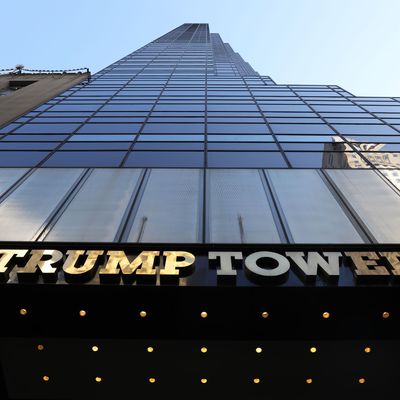
In the summer of 2016, Donald Trump Jr., Jared Kushner, and Paul Manafort took a meeting at Trump Tower with a Kremlin-connected Russian lawyer who promised to turn over dirt on Hillary Clinton. The meeting, along with the subsequent attempts to conceal its true purpose, is extensively covered in the redacted Mueller report. Here’s what the special counsel has to say about it:
Trump didn’t know about the meeting before it happened.
According to his own statements to the special counsel, Trump didn’t know about the meeting until months after it happened. Mueller’s team also “found no documentary evidence showing that he was made aware of the meeting — or its Russian connection — before it occurred.”
Michael Cohen, Trump’s former lawyer, told Mueller’s team that he thought that wasn’t true. But his belief “that Trump Jr. had previously discussed the meeting with his father,” was weighed against the fact that he “was not involved in any such conversation.”
There was a meeting before the meeting.
From the Mueller report:
Rick Gates, who was the deputy campaign chairman, stated during interviews with the Office that in the days before June 9, 2016 Trump Jr. announced at a regular morning meeting of senior campaign staff and Trump family members that he had a lead on negative information about the Clinton Foundation. Gates believed that Trump Jr. said the information was coming from a group in Kyrgyzstan and that he was introduced to the group by a friend. Gates recalled that the meeting was attended by Trump Jr., Eric Trump, Paul Manafort, Hope Hicks, and, joining late, Ivanka Trump and Jared Kushner. According to Gates, Manafort warned the group that the meeting likely would not yield vital information and they should be careful.
Trump wanted to hide emails arranging the meeting.
When the White House found out about emails setting up the meeting between Trump Jr. and British music publicist Rob Goldstone, some officials got scared. Former White House communications director Hope Hicks in particular thought the emails were “really bad” and their release would be “massive.” Trump rejected her idea to proactively leak the emails and insisted they would stay secret if access to them was limited.
Trump directed Hope Hicks to release a false statement about the meeting.
Mueller considered bringing charges related to the meeting.
When Kushner, Manafort, and Trump Jr. showed up at the meeting in Trump Tower, they anticipated receiving damaging information on Hillary Clinton. That alone was enough for the special counsel to consider bringing charges. Ultimately, Mueller’s office determined “the government would not be likely to obtain and sustain a conviction.”
On the facts here, the government would unlikely be able to prove beyond a reasonable doubt that the June 9 meeting participants had general knowledge that their conduct was unlawful. The investigation has not developed evidence that the participants in the meeting were familiar with the foreign-contribution ban or the application of federal law to the relevant factual context. The government does not have strong evidence of surreptitious behavior or efforts at concealment at the time of the June 9 meeting.
Jared Kushner was very bored in the meeting.
Once it became clear that the Russian lawyer, Natalia Veselnitskaya, had little dirt on Clinton, Jared Kushner tried to get out of the meeting. He sent “two separate emails to assistants at Kushner Companies with requests that they call him to give him an excuse to leave.” It worked, as Kushner left the meeting before it ended.





























